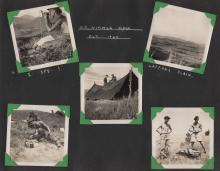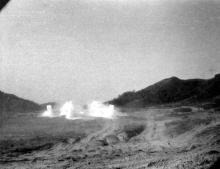The name 'Laffan's Plain' seems to have fallen out of use, but it marked a flat area in the north-east New Territories, near the border with China. We heard about it from Peter Binstead, who said that one of the tank ranges in the 1950s was located there.
Moddsey gave us the background on the name: Laffan's Plain comes from the former British Army parade ground in Aldershot, England and is named after Lt. Gen Sir Robert Laffan of the Royal Engineers. I think, today the area is known as Ta Kwu Ling.
Another mention of the plain is in Major-General Maltby's summary of the fighting in 1941: At 0800 hours 8th December the Japanese began bridging at Lo Wu and our observation posts reported hundreds of Japanese crossing into Laffans Plain. This was later estimated to be a battalion and it seems fairly certain that a two battalion front was adopted—the other battalion going later straight down the Taipo Road.
So it looks as though the name was familiar to the British Army, but probably not widely used elsewhere. Maltby's notes about the invaders entering via Lo Wu and Laffan's Plain also suggest why the 1950s tank ranges that Peter mentioned were at Lo Wu and Laffan's Plain - it would train the tank crews in the area they'd most likely be deployed. Fred Evans' description of the army's role was to delay any invasion from China for 48 hours, so fighting in those areas would have been heavy.
Here are the photos from Fred Evans that show tank ranges. If anyone can identify where they were taken, please click on the photo and leave a comment.


Comments
1930s Laffan's Plain
re: Laffan's Plain
That pulls the name back a bit earlier - I wonder when it was first used.
Looks like I had the location a bit too far south too - I've nudged the marker up a bit.
1930s Laffan's Plain
Laffan's Plain, 1942
There's a brief mention in the description of Captain A. G. Hewitt's escape from the Sham Shui Po Camp:
At dusk we set off again, but it was really too light, and in a very short time we had attracted the attention of not only the peasants but also a Japanese working party which was repairing a bridge on the Fanling-Shataukok road. Scriven was dressed in an Army jersey and trousers, Crossley in R.A.F. blue service dress, and I was wearing an Army jersey and service dress trousers. Each of us carried an Army pack on our backs. It must have been painfully obvious that we were escaped British prisoners. To make matters worse, a truck-load of Japanese soldiers passed down the main road just as we were about to cross it. Surprisingly, however, no one attempted to stop us, and we crossed the road and made our way across Laffan’s Plain, swam the Sham Chun river, and crossed the border into China.